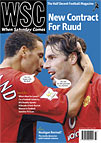 In spite of Sepp Blatter's recent crass remarks, football females are on the rise and England may soo have a professional league, as Dianne Millen writes
In spite of Sepp Blatter's recent crass remarks, football females are on the rise and England may soo have a professional league, as Dianne Millen writes
As tantrums go, it was almost Keeganesque. When Albion Rovers went down 1-0 to Montrose earlier this season, then manager Peter Hetherston was in no doubt about where to direct his fit of pique: at Morag Pirie, Scotland’s most senior female official. “I knew it wasn’t going to be our day when I found out we had a woman running the line,” he ranted. “She should be at home making the dinner for her man after he has been to the football. This is a professional man’s game.”
Hetherston’s remarks say nothing about Pirie and everything about his desire to keep football untainted by feminine intrusion. Sadly for him – and for those who undoubtedly shared his views in private despite condemning them in public – women referees are gaining a firm whistlehold on the game. Ten years after FIFA appointed the first female assistants, almost 50 per cent of member associations now have international-level female referees or assistants.
And although there is a slightly patronising whiff about UEFA’s view that women refs have improved so much in the past four years that they can now be allowed to handle proper men’s competitions, the growing view that total integration will soon be achieved is good news for all who don’t see football as solely a “professional man’s game”. But it will be interesting to see how managers react when women officiate in high-pressure Champions League and international matches, a move UEFA now see as inevitable. Will they be held to a higher standard and judged more harshly than men, as tends to happen in other male-dominated occupations? Or is there potential for better matches? Several leading female officials report they experience less swearing and dissent from male players (although not from women players). Although to some this may represent yet more feminine sanitising of the “man’s game”, anything which reduces petulance, handbagging and “simulation” should be welcomed.
In future, however, women officials seeking to test their skills in professional matches may not need to turn to the men’s game at all. The Football Association have drawn up detailed plans for professionalism (presumably complete with irate female managers calling for male officials to stay in their garden sheds). According to the FA’s Bev Ward, the watchword is sustainability – a conclusion partly drawn from a long, hard look at men’s football. “We’re working with the top women’s clubs to develop their business plans and help them to attract more people so they have a better chance of commercial sponsorship through increased gates and marketing revenue. We’re taking a step-by-step approach to raise the standard and profile, to ensure the finances are in place and the model will work.” Although the FA haven’t put a timescale on this plan, it’s likely that a long haul lies ahead, although England’s hosting of the 2005 Women’s European Championship will be a potential springboard.
While there’s no equivalent plan in Scotland as yet – perhaps due to the all-round lack of money in the game – the challenges are similar. Fundamentally, the sport must break out of the current media catch-22 where fans are needed to ensure media coverage and hence revenue, but coverage is required to attract the fans in the first place.
As Hibs Ladies and Scotland midfielder Kirsty McBride points out, convincing people that the women’s game is worth watching can be difficult. “There’s enough talent, commitment and dedication to justify a professional league, but where’s the money going to come from? Although Scotland gets a big crowd, when I play for my club there’s only the parents there. Women’s football doesn’t get enough recognition in the media. The standard of play is superb but people don’t know that.”
There’s no doubt that most women players – just as passionate about their sport as the men, if not more so – would welcome the chance to achieve their full athletic potential without heading to overseas leagues. Professionalism also improves quality, as Fulham Ladies demonstrated during their virtually unbeaten three years as full-timers. But in some ways the current lack of commercialism in women’s football, where a fan can still be a fan and not a consumer, makes a pleasant contrast to the unattractive cynicism of a men’s game that increasingly seems to exist for the sake of revenue rather than vice versa.
Equally, however, neither should any quasi- Corinthian ideal of genteel amateurism be allowed to hold women back. The women’s game has a unique opportunity to develop into a well run professional sport that gives its players opportunities without alienating the existing fan base or repeating the hubristic mismanagement of so many men’s clubs. If it succeeds, it wouldn’t do the “professional man’s game” any harm to take a look back across the gender divide to see what can be learned in return. Although Peter Hetherston might not agree.
From WSC 205 March 2004. What was happening this month